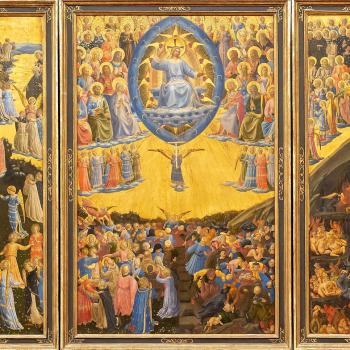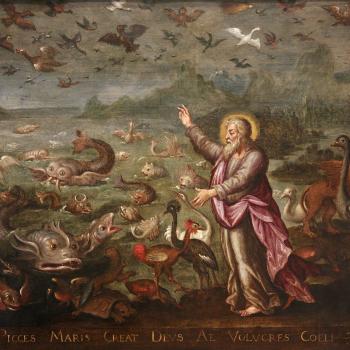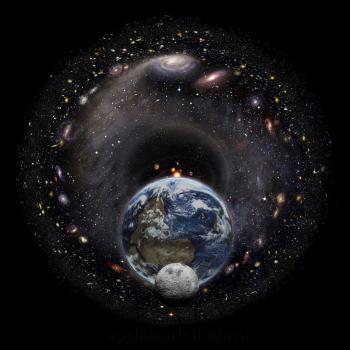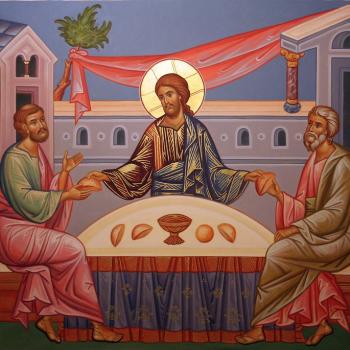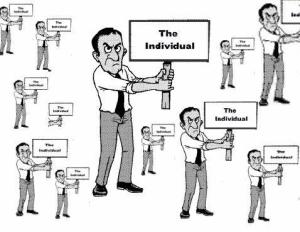
Conflicts arise in the world because we deal with the world in a dualistic fashion, dividing creation up into all kinds of absolutely independent entities instead of promoting and realizing and the unity which underlies all things. That dualism is fashioned upon the way we view ourselves. We construct a notion of our identity, creating a fictional (or false) self. Then we use that fiction to first divide the world between that which we assume to be a part of ourselves, and that which we believe lies outside ourselves. When we do so, we then create notions of other such selves, other separate entities, some which are subjects in their own right, and some which are mere objects. Having created our outlook of the world, we then try to find ways in which our constructed self can have power and influence over everything else, which often means, taking control of others, forcing them to be vessels of our will (and so, in a way, we seek to deconstruct and them absorb what we believe lies beyond us as a way to grow). This perspective, and the way it influences our actions in the world, causes strife and violence in the world, for what is seen as lying outside of us, and outside of our control, becomes seen as a threat to our existence which we must take out before it takes us out. Thus, it can be said that when we view the world dualistically, we use relative distinctions which exist in the unity behind creation, and use them as breaking points to create independent individuals. This is what must be overcome. The fractures which divide the world must be healed. And in the eschaton, this is exactly what is going to happen. Dualism, with the conflict it brings, will be overcome, and the peace of Jesus’ kingdom will be present to all. Just as the persons of the Trinity share all things with one another, so we will find ourselves sharing all things of the kingdom with one another, as St. John Chrysostom preached:
Then, all these troubles have been taken away and there are no diseases, no sufferings, no grounds for sinning. Then, the coldhearted words, “what’s mine,” and “what’s yours” no longer exist to bring every dread evil into our lives and to cause countless conflicts.[1]
Individualism, like any error, has at its foundation a truth which it uses in a distorted, indeed, exaggerated fashion. That truth is the relative distinction found in the various elements of creation, distinctions which, when dealing with creaturely subjects, forms the basis of persons, that is, interdependent subjects who come to know themselves properly only in and through their relationships and unity with everyone else. Individualism corrupts reality by having persons disconnect from each other, to try to exist in a kind of self-establishing isolation, having use embrace what we discern of ourselves in such isolation, using that and that only as the way to define and understand ourselves. Individualism has us create for ourselves a false “I” which we believe is absolute and independent of all things. As it uses the person as the foundation for the false “I,” it embraces just enough of the truth to make it difficult to overcome its deception. For, what it hides from us is the way the person is cut off from the community it needs to truly realize its personhood. And, once we are cut off this way, we find ourselves cut off from much which we need for our own ultimate happiness, for much of what we need lies not in ourselves, but in the rest of creation (and with God).
We should do what we can to embrace grace, overcoming the disposition which causes us not only to sin, but to sin grievously. We should, as much as we can, realize the eschaton in our daily lives, overcoming the individualism which leads to such absolute divisions, to the dualism which causes pain and sorrow. We are to follow the path of love, the love which unites everything in the world together as one, and then unites the created order with heaven, that is, the love shown and established in the incarnation. God shows us by it that even in our sin, and in the spiritual death sin has us experience, God’s love remains with us. That love could not and will not be destroyed by us, no matter how much we fight against it. God confronts us in our egotism, not with hatred or condemnation, but with love, showing us what we should be and giving us the love and grace we need to attain it. God, therefore, comes to us to raise us out of our dead egotism, and then, as we slowly find ourselves no longer absolutizing the division between us and others, and between creation and the kingdom of God, we will slowly find the glory of the kingdom of God is manifested in all.
We cannot save ourselves. The more we focus on ourselves, and try to fix all things in and through ourselves, we just fall back to the individualistic scheme which created the problem in the first place. The more we struggle all by ourselves, the more we cut ourselves from the links we should have with the rest of creation. Sadly, once those links have been broken, we do not have the power to recreate them. But thankfully, we don’t have to. God does it for us. God is the one who broke down all the divisions, and restored – or created a new – what had been destroyed:
But God, who is rich in mercy, out of the great love with which he loved us, even when we were dead through our trespasses, made us alive together with Christ (by grace you have been saved), and raised us up with him, and made us sit with him in the heavenly places in Christ Jesus, that in the coming ages he might show the immeasurable riches of his grace in kindness toward us in Christ Jesus. For by grace you have been saved through faith; and this is not your own doing, it is the gift of God — not because of works, lest any man should boast. For we are his workmanship, created in Christ Jesus for good works, which God prepared beforehand, that we should walk in them (Eph. 2:4-10 RSV).
No one of us can boast as if we did all the things which Jesus did for us. We cannot boast of the restoration of our nature, and with it, our natural connection to the rest of creation. Such boasting only shows we are still disconnected from the world, as it shows we still are emphasizing and following the “I” over the rest of creation. We must let that egotism and false self die so that Jesus can then recreate us and lift us up out of the spiritual death we find ourselves in thanks to that false self. The delusional I is our attempt to create something out of that death, but it must be cast away if we are to rise up from the realm of the dead and embrace the life of the kingdom of God. Individualism keeps us in the realm of spiritual death. The only solution is to embrace the death of that self so that we allow such death conquer our spiritual death; for then we can find, in our embrace of Jesus beyond ourselves, the life which we want and need.
We were created to experience deification, and in that deification, to engage grace, to act upon it, and so to do works. Not boasting of works, realizing, moreover, we cannot and should not do everything ourselves, does not mean we are to do nothing. We are to realize the person we are (or have become) in Christ, relating, therefore, as a person to the rest of creation and with God. Individualism tells us to do works which will only reify our spiritual death, which is why works, done in and through an individualistic spirit, leads only to a dead end. God, however, transcends the limits we create for ourselves through our individualism. God is able to reach us, even in our individualistic shell, and does so in and through Jesus and the Holy Spirit. They show us the division which we have created is false, enticing us, then to respond to them by accepting the grace which we are offered, so that through such grace, we transcend the self and experience the true life, the life which we were meant to experience, the life of the kingdom of God. This is our end, but as the eschaton is immanent, it is also something which we can experience, in part, now, and the more we do so, the more we will bring peace not just to ourselves, but to the world as well.
[1] St. John Chrysostom, On the Incomprehensible Nature of God. Trans. Paul W. Harkins (Washington, DC: CUA Press, 1982), 166 [Homily 6].
Stay in touch! Like A Little Bit of Nothing on Facebook.
If you liked what you read, please consider sharing it with your friends and family!




